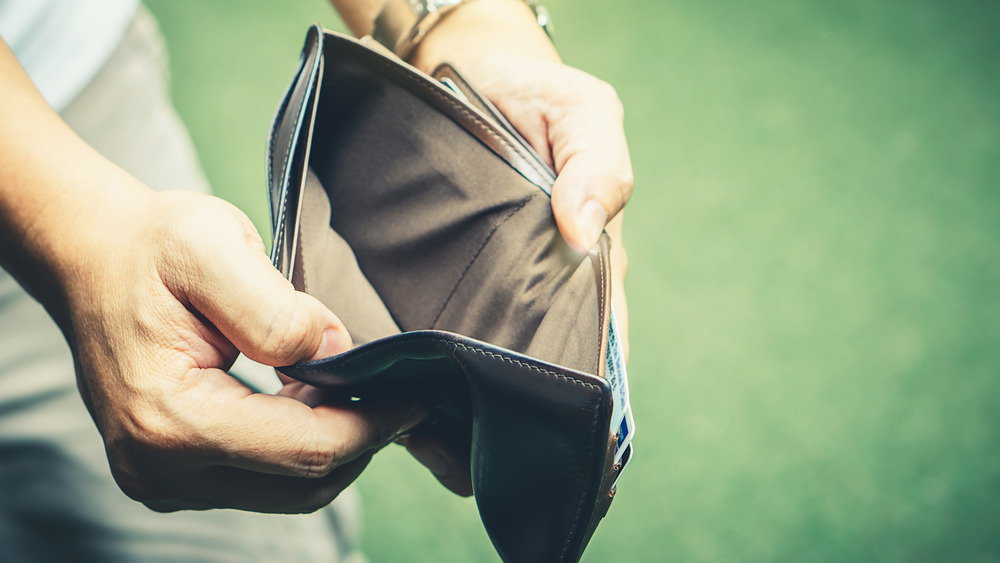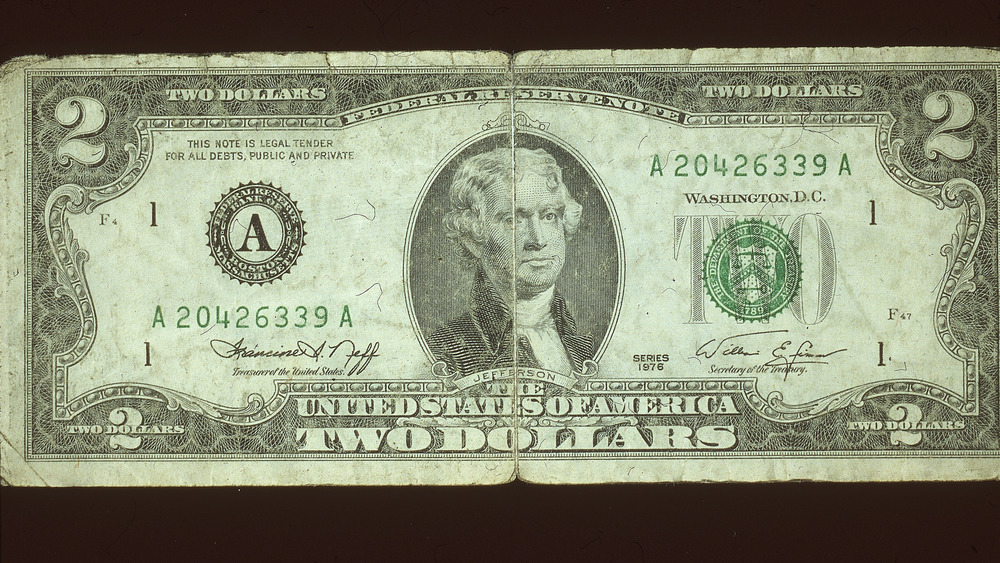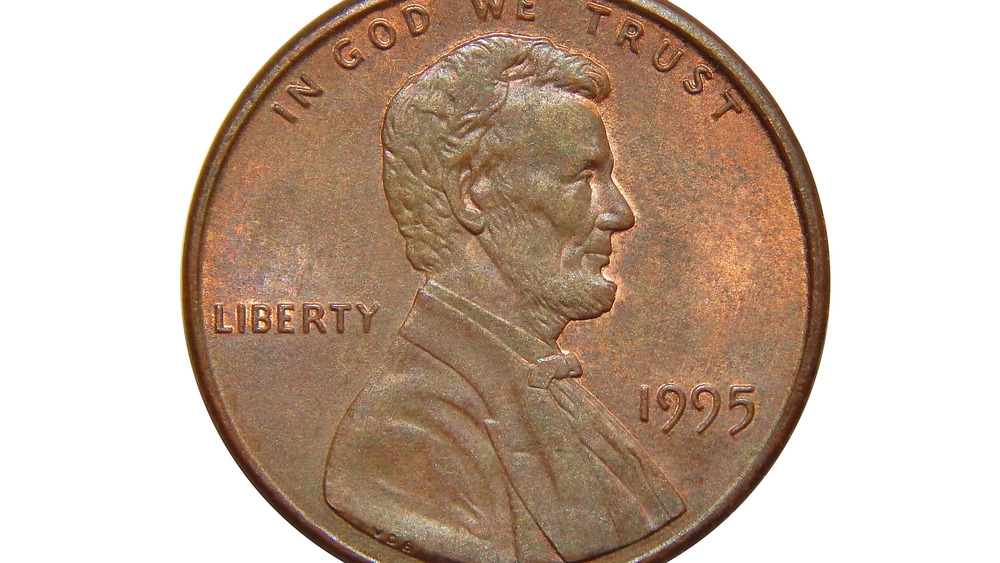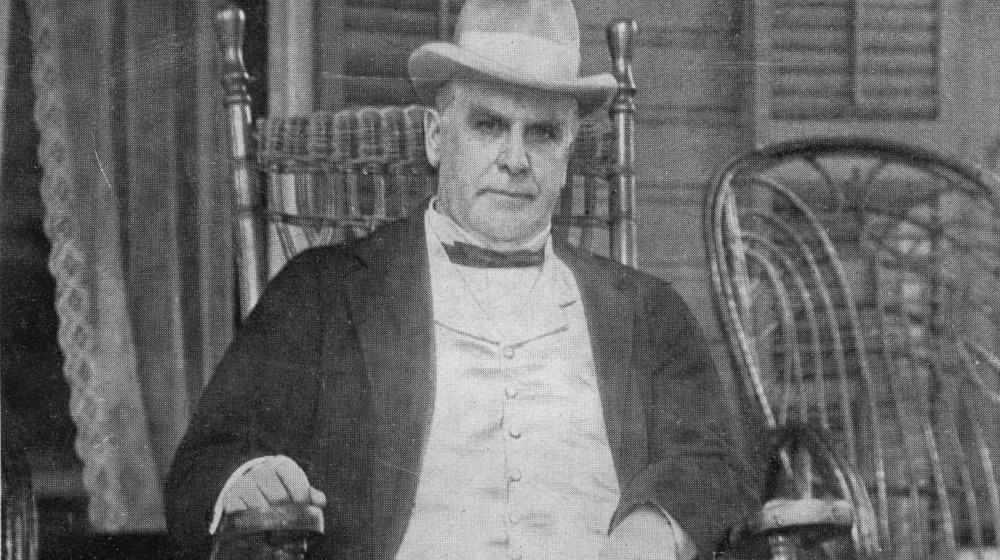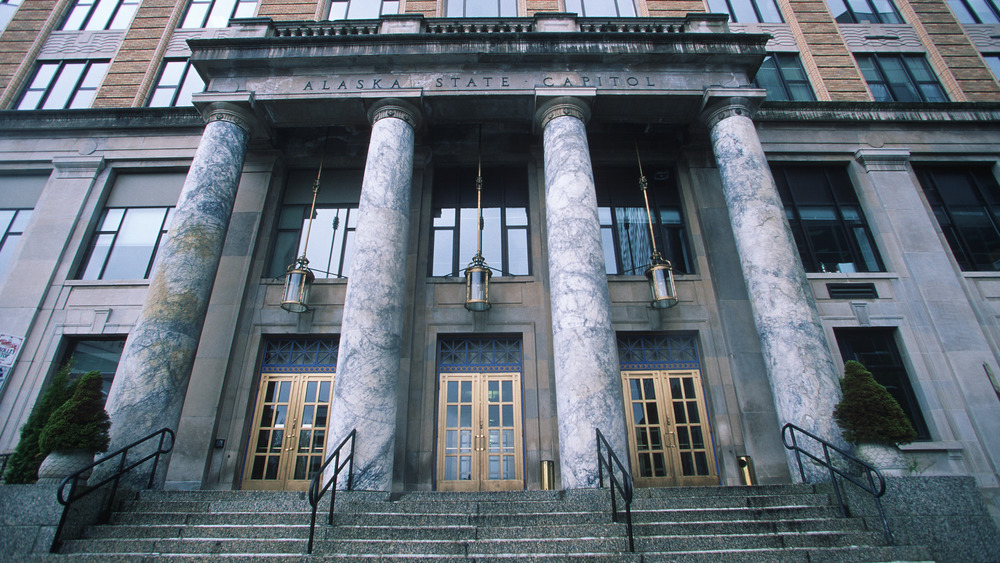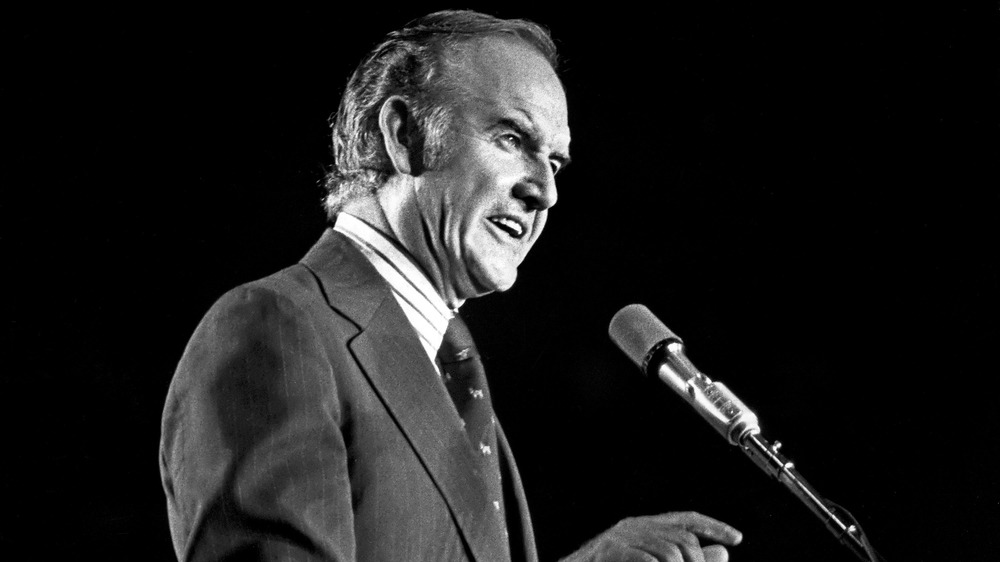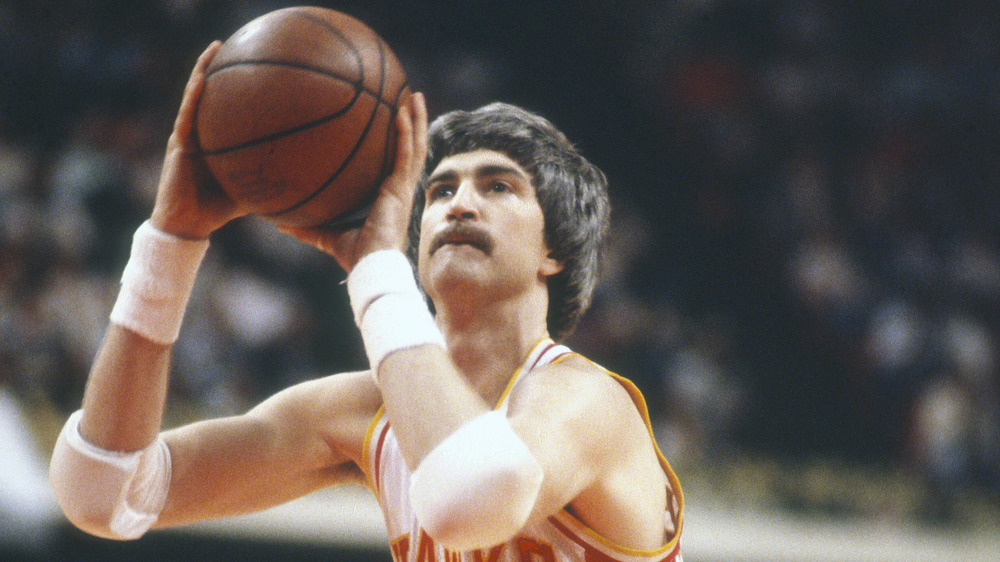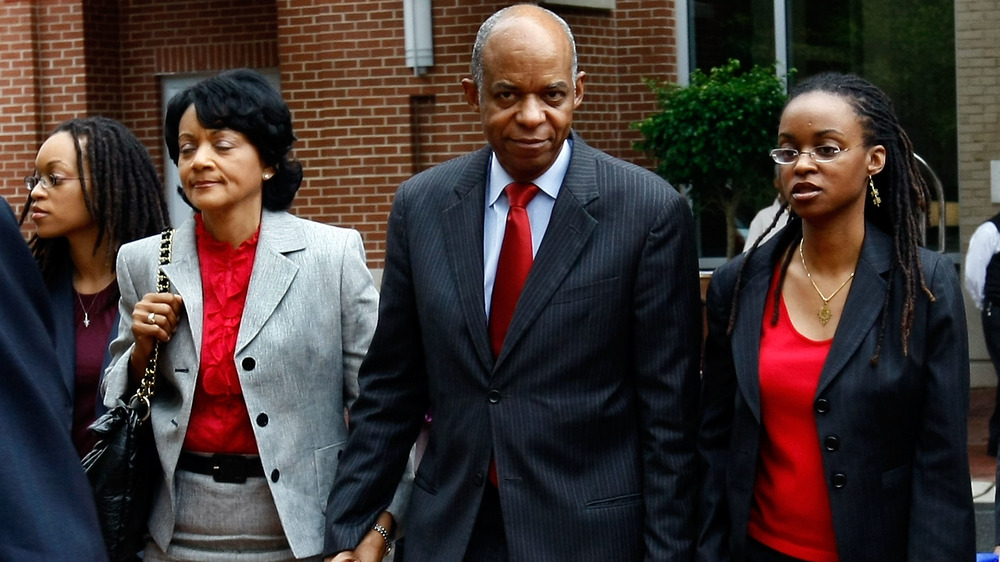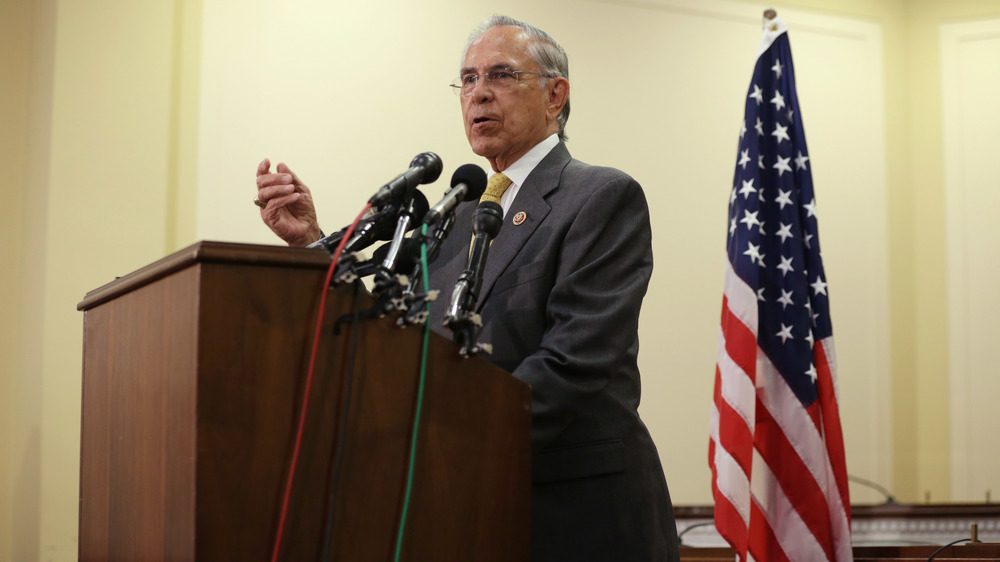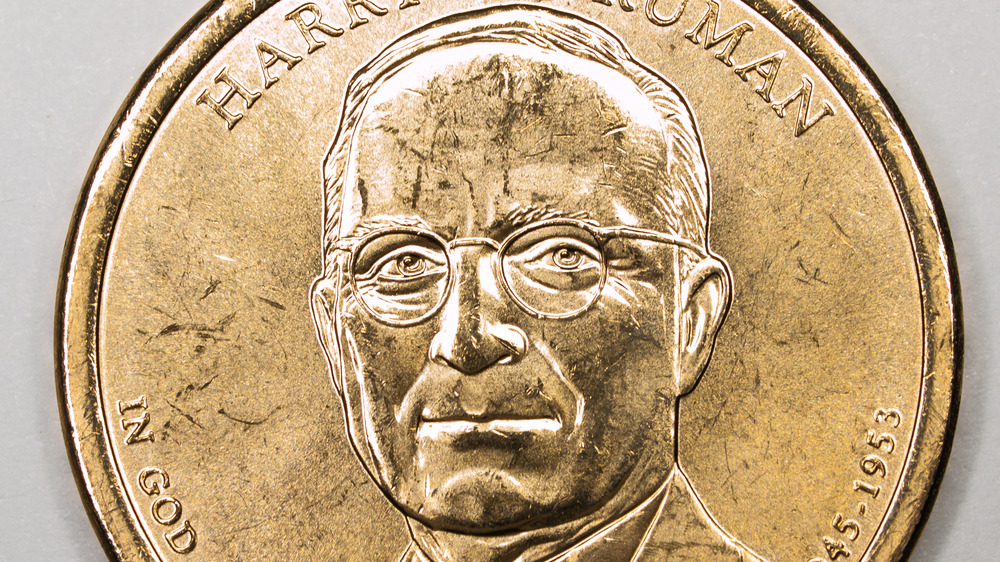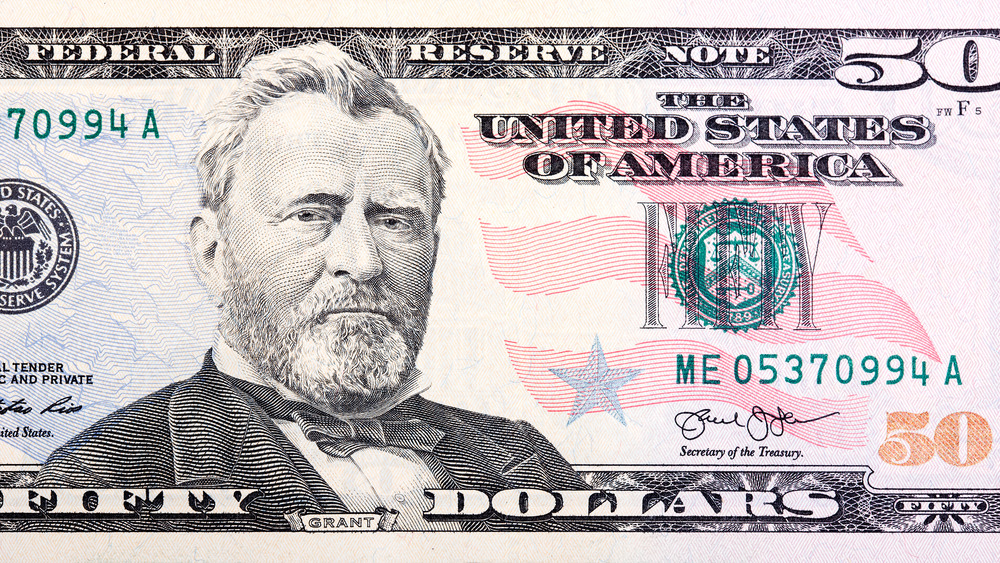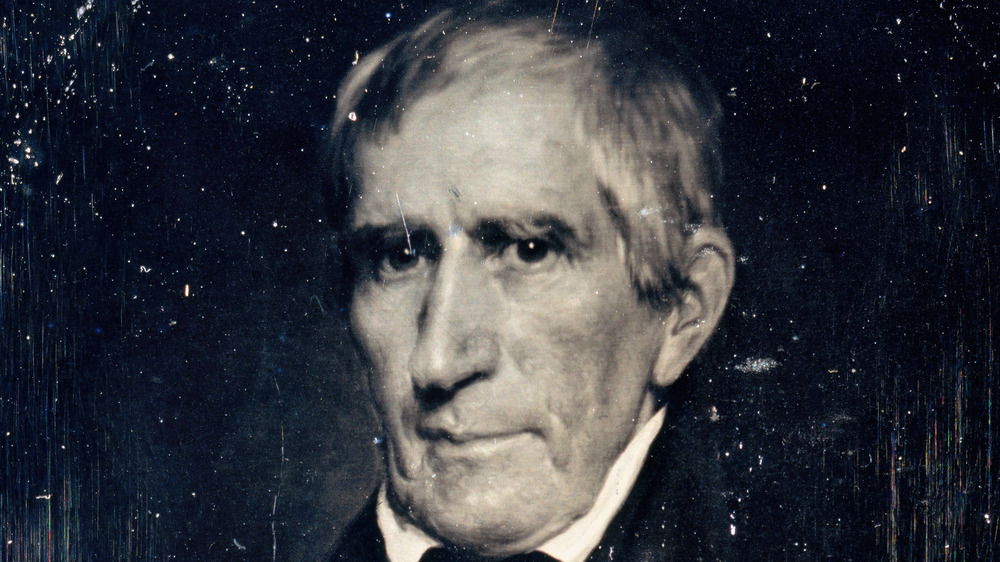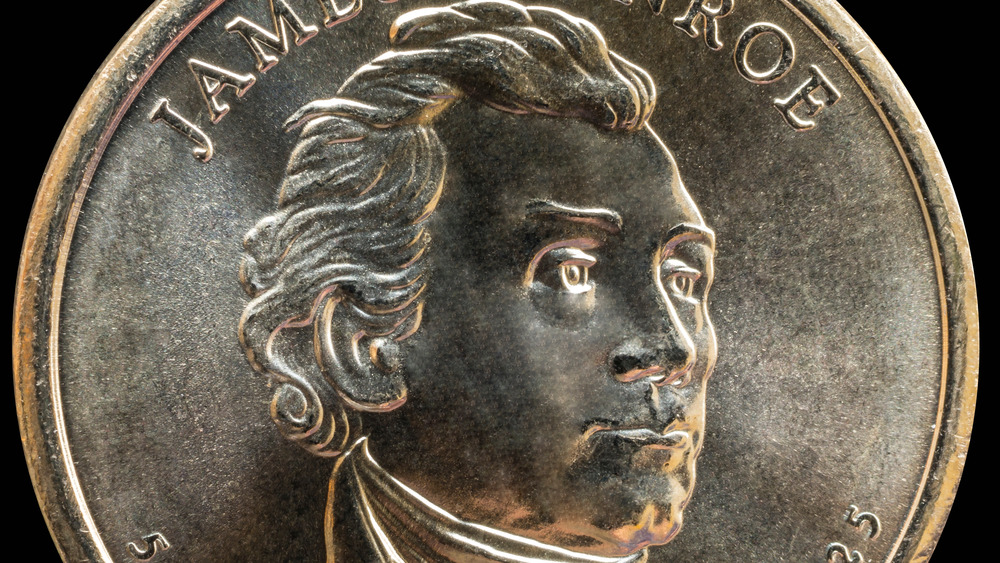Politicians Who Lost All Their Money
Being the president of the United States of America comes with some financial perks. The greatest private plane on (or above) Earth, your own theme song played by a Marine Corps band, $400,000 a year, a $50,000-a-year expense account, and (per Business Insider) a pretty sick retirement plan that includes lifetime Secret Service protection. On top of that, as the Street explains, modern presidents can also be assured of multi-million dollar book contracts or hundred-thousand-dollar speaking engagements.
Of course, not all presidents had access to these benefits, not all politicians are the president, and some politicians just shouldn't be allowed near currency. While of course the minority (heck, today almost half of Congressmembers are millionaires, according to ABC), some of America's esteemed elected officials have covered themselves in far more debt than they have glory.
Thomas Jefferson died so broke his family had to sell everything
Thomas Jefferson served the country before it became a country. He wrote the Declaration of Independence, was the second vice-president in history, and then the third president. He commissioned the Lewis and Clark Expedition, doubled the nation's size with the Louisiana Purchase, and ended the pirate threat in the Mediterranean (with our first foreign war, so make of that what you will). It would be difficult to understate the importance of Jefferson to American history. Jefferson was a lawyer, state legislator, farmer, vintner, architect, and author who owned hundreds of acres (and hundreds of people).
So how did such an august and accomplished man end up, as Forbes describes it, the country's "most financially challenged founding father?" It seems that he did the exact same thing millions of Americans do today — he spent more than he had. Jefferson lived far outside of his means, and according to the Thomas Jefferson Foundation, the former president may have lived his entire adult life in debt. In fairness, he did inherit a huge debt from his father-in-law early in his marriage, but the main reason seems to be that "Jefferson lived perpetually beyond his means, spending large amounts of money on building projects, furnishings, wine, etc." A truly American president, Jefferson just liked to buy more than he could afford.
Abraham Lincoln went broke running a general store
Like most American presidents of the time, Abraham Lincoln was a man of many talents. According to the Smithsonian, "Abraham Lincoln Is the Only President Ever to Have a Patent." He was also a lawyer, wrestler, state politician, and the first Republican president, plus he ushered in the end of the Civil War so he's kind of a big deal. It wouldn't be strictly accurate to say Lincoln went broke, more like he returned to it. Born into poverty in that famous log cabin, his mother died when he was 9, and he literally worked barfeoot in the fields alongside his father and sister. Lincoln's origins were the definition of humble.
When he was 24 years old, Lincoln and a friend went halfsies on a general store in Illinois. Lincoln didn't have the money, signing a promissory note to the previous owners instead. Unfortunately, as Snopes explains, "competing against a larger, well-organized store in the same town; their outfit did little business, and within a short time it had 'winked out.'" The deadline on his note came due, Lincoln couldn't pay it, and all of his possessions were confiscated. To make matters worse, his business partner died and died broke. Honest Abe assumed his half of the debt, and it took the future emancipator many years to pay it off in full.
William McKinley helped a friend and ended up bankrupt as president
William McKinley was the 25th president and the first of the 20th century. He swiftly and successfully led the nation through the Spanish-American War (picking up Puerto Rico, Guam, and the Philippines), annexed the Republic of Hawaii as a new American territory, and officially pegged the dollar as backed by gold. McKinley was also the third American president to be assassinated, although he was a pretty popular president who won reelection in a landslide.
Although his family did well enough to secure him a good school and college, McKinley wasn't born wealthy. He became wealthy with a busy legal career, which boosted his profile and made it easy to enter Congress where he was very popular with the voters and, ironically, he would earn half as much as he did practicing law.
Years earlier, McKinley had cosigned on a debt for a friend that got him into financial trouble when the friend went bankrupt. McKinley ended up in debt to the tune of $3 million in 2019 dollars. As a result McKinley was forced to declare bankruptcy himself, while serving as the governor of Ohio. However, says the University of Virginia's Miller Center, he "gained widespread public sympathy when his own financial fortunes suffered...Winning favor with the voters, he was returned to the governor's office."
Alaska State Representative Vic Kohring was bribed with dinner
Vic Kohring was a state representative serving the Mat-Su Valley in the Alaska State House when he was arrested by the FBI as part of a sweeping corruption probe in the mid-2000s. An oil services company, VECO, had been bribing a number of legislators for years until the scandal broke and several senators, representatives, lobbyists, and staffers were arrested. As federal investigators looked for "evidence that would show ties between VECO and state legislators," reports PBS, they found plenty of damning material, "including clothing that is mockingly labeled 'Corrupt Bastards Club.'"
Many of the Corrupt Bastards went to jail, including Kohring, but his story was different. According to the Spokesman-Review, the CEO of VECO testified that they "gave cash to Kohring because he was short on money for food and housing in Juneau." He was literally bribed with rent money, dinner, help with his credit card debt, and as Kohring explains himself, "a thousand dollars in gifts for my daughter."
Unfortunately for him, the VECO payments didn't improve his financial situation all that much. As the Mat-Su Valley Frontiersman describes, "Kohring seemed to have one tale of financial hardship after another, famously getting rides to court from his attorney and from friends, and once even hitchhiking into Anchorage to make an appearance." Kohring denies ever having taken bribes. He was released from prison in 2009, after prosecutor misconduct overturned his original conviction and got a new sentence of time served.
George McGovern invests everything in a hotel and loses it all.
George McGovern was an accomplished man — a U.S. senator, U.S. representative, World War II veteran, and historian. He flew bombing raids over Germany during World War II, earning the Distinguished Flying Cross for heroism in the air, and in his very first year in the senate he also became the first congressman to criticize American involvement in Vietnam. As his 2012 obituary in the Christian Science Monitor summarized, "A war hero who fought for peace." Unfortunately McGovern is best known as being on the receiving end of one of the worst U.S. election defeats in history, losing every state except Massachusetts (plus D.C.) to incumbent Richard Nixon in 1972. Of course, that's not all he would lose.
After McGovern left politics, he bounced around the world giving lectures. He seemed to be finally settling down in the late 1980s, and in 1988, he went all in on a property in Stratford, Conn., writing later in the Wall Street Journal, "Hotels, inns and restaurants have always held a special fascination for me." Regrettably, the former Democratic presidential hopeful not only didn't quite understand how private business works and filed bankruptcy just a year and half later (it didn't help that he was also sued by "individuals who fell in or near our restaurant"), saying years later that he would've been a better politician if he had gone broke first.
Congressman Tom McMillen chooses the wrong time to invest in pagers
In 1981, Tom McMillen founded the McMillen Communication Corp, manufacturing beepers. It was the 1980s, pagers were everywhere, and so ubiquitous that by the end of the decade Sir Mix-A-Lot's classic track "Beepers" made it to number two rap song on Billboard. By 1992, McMillen was a congressman running for reelection, and his company was going bankrupt. In a classic case of the Streisand Effect, the congressman changed the name of his company to the Pager Communication Corp, and the Baltimore Sun noticed. Just a month before the election. "Several disgruntled investors have charged that the...last-minute name change was designed to shield Mr. McMillen...from the potential political embarrassment of being closely associated with a failing business."
Sadly for McMillen, he became former congressman that year. The hits kept coming though, as the Baltimore Sun would remark five years later, after federal agents seized financial records from one of his bankrupt firms, "Since 1992, McMillen has become involved in numerous business ventures, often in risky, start-up companies that have flopped or suffered other problems." Although no charges were filed, he did lose his position as chairman of President Bill Clinton's Council on Physical Fitness and Sports. At least this former congressman, Rhodes Scholar, Oxford alum, and serially terrible businessman has kept his title as tallest congressmember in history. At 6-feet 11-inches, he towered over his colleagues like the former NBA player he is.
Louisiana Congressman William Jefferson was in debt and in jail
Louisiana Democratic Congressman William Jefferson was running for his tenth reelection when the Justice Department indicted him on 16 charges of corruption. Amazingly, Jefferson won his party primary even, per CNN, after a search of his house turned up $90,000 in cash hidden in his freezer, but he lost the general election. Then he lost in court too. The next year, reported nola.com, he was convicted on 11 of the 16 counts and sentenced to 13 years in federal prison. According to Roll Call, it was "the longest-ever sentence for a current or former member of Congress."
As if being sent to jail for over a decade weren't bad enough, it was revealed during the trial that Jefferson was heavily in debt. After the trial, $5.7 million in lawyers' fees, and "a request for more than $478,000 in forfeitures from the federal government," the now-former congressman was in debt by nearly $10 million. After a few years of appeals, he remained convicted of ten of the original 16 charges and in 2012 began his sentence dead broke.
He was released just five-and-a-half years later due to a series of technicalities that forced a federal judge to vacate seven of the ten remaining charges. His sentence was changed to time served, and by spring of 2018, he was a free man looking to stiff his former investors of the $392,000 the federal government says he owes them.
Texas Congressman Ruben Hinojosa was really bad with finances
One might think that a seat on the Financial Services Committee of the U.S. House of Representatives would require a member to not be in debt to the very banks they'll be regulating. That is however not the case, as was demonstrated, with the irony not unnoticed by the media, by long-time Texas Democrat Ruben Hinojosa, who did indeed sit on that committee when he filed for bankruptcy in 2010. He had accrued nearly $3 million in debt, most of which, according to the Huffington Post, "Hinojosa attributed his bankruptcy to a loan he secured to rescue...a slaughterhouse founded by Hinojosa's father and uncle, after the company declared bankruptcy in 2008."
Others were less kind in their speculations on the reasons for his financial ruins, including profligate spending on his part. "In the five months since filing for bankruptcy," reported the Daily Caller in 2011, "Texas Rep. Ruben Hinojosa has spent about $1,800 on clothes, $680 on cleaning service and given his children a total of $540 in allowance." A point his political opponents relished a few years later when it was revealed Hinojosa was among several congressmembers forced to return gifts worth thousands of dollars they were given on a trip, said The Hill, then-unknowingly sponsored by the government of Azerbaijan.
Harry Truman was so broke Congress raised the presidential salary
Harry Truman desegregated the military, helped rebuild Europe after WWII, and dropped the only nuclear weapons ever used in war. Not bad for a guy who became president after being vice-president for less than three months. He was also perennially unlucky with money and has ended up known by many as the poorest American president.
The son of a farmer, Truman did not grow into wealth. The Truman Library at the National Archives has his nostalgic records of working at a drugstore at 14 and sleeping and "living in hobo camps along the Missouri River" after school in order to work at the railroad. After serving overseas during World War I, Truman opened a haberdashery with an army friend but had to close within three years, deep in debt. "It was a hard experience for me at the age of 38," said Truman, "to fail in a business venture in which I had spent considerable money and time."
Then he became president, the most powerful man in the world and earning $100,000 a year. But after leaving the White House, Truman's income dropped to poverty level until, according to Forbes, "in 1954 he earned just $13,564.74." The former president quickly rebounded, began writing and speaking gigs, and within another three years he was making, in addition to his monthly military pension of $112, over $100,000. In response to Truman's situation, modern presidents now have a full retirement package.
Ulysses S. Grant nearly died penniless
Even though he was the general who won the Civil War, Ulysses S. Grant's tenure as president hasn't gotten the best reputation over the years. He may have whooped the Ku Klux Klan but, as PBS describes it in their biography of him, Grant's "two terms as president are best remembered for financial scandals among members of his party and his administration." Financial trouble defined much of his life, in fact, before and after his presidency as well as during.
After fighting in the Mexican War, while he was stationed in what would become Washington state, Grant became involved in several investments that went bust. After resigning his commission in 1854, Grant tried to start farming in Missouri on property his father-in-law set aside for him. The farm failed within a few years, and Grant was forced to accept working as a clerk in his father's store in Illinois.
After the presidency, the Smithsonian explains, "the most famous man in America was determined to make a fortune in investment banking." He lost it all quickly however and within two years was borrowing money from his son. He tried again with help from his son only to be robbed by his son's business partner. He started to write his memoirs after being diagnosed with cancer, seeing no other way to provide for his family. He was almost swindled again until Mark Twain stepped in and offered him a fair publishing contract.
William Henry Harrison died as president while still in deep debt
Like most American presidents, William Henry Harrison came from a political family. The last president born in the colonies, instead of the U.S., he was also the last of seven children. Which "under the laws and customs of the day," as the University of Virginia's Miller Center describes it, "limited his prospects." When his father died, his elder brothers got basically everything. Without money to pay for medical school, Harrison joined the army.
After leaving the army, Harrison actually did well for a while, climbing the civil service ladder, making investments, and buying property. He kept trying to get higher into government either by elected office, eventually reaching the U.S. Senate, or by appointment, as he did as ambassador to Columbia. While overseas he was unable to manage his farm, which after a particularly bad season, "did not perform well, and money problems grew; he was reduced to a menial job as recorder for his county to make ends meet."
Harrison was still deep in debt when he was running for president in 1840. Ironically one of the biggest issues in that election, says the Miller Center, was that "the nation was on the brink of economic disaster." The incumbent president, Martin van Buren, was called Martin van "Ruin," and Harrison won handily. He died just one month into his presidency after giving a two-hour inaugural address in the cold without wearing a hat or coat.
James Monroe asked Congress for help with his debt
Known as the last "Founding Father," according to the White House Historical Association, and born into a fairly wealthy family, James Monroe still didn't have the easiest upbringing. His parent both died when he was a teenager, forcing him to leave school at 16 to manage the family property and raise his younger brothers.
Monroe entered politics as public sentiment agitated against the British. And when the Revolutionary War began, he enlisted into the Continental Army. His legal and political career took off quickly, going from the Virginia House of Delegates to the U.S. Senate to the presidency. Being president didn't pay much then, and Monroe left the White House in debt.
After his presidency, Monroe tried to pay off his debts. First, says the Miller Center, by "pressing the federal government for tens of thousands of dollars due him from past services." He also began writing books, including his autobiography. Perhaps most desperately, on the advice of a friend, according to the Library of Congress, Monroe even tried to sell his personal correspondence with Thomas Jefferson to the former president's family, "an offer that was apparently not accepted." Monroe was finally able to prevail upon Congress to pay him a portion of what he felt he was owed so he could settle his debts.
